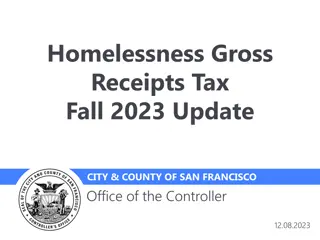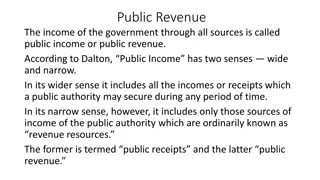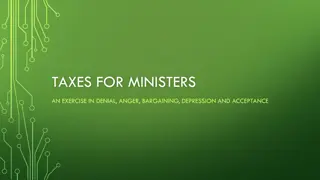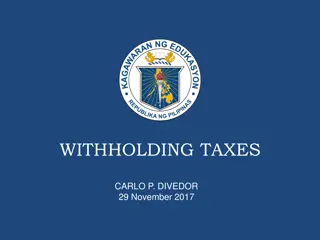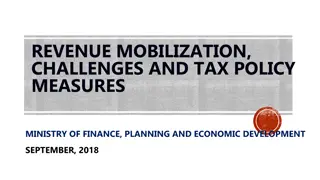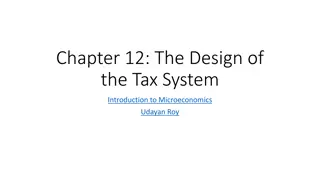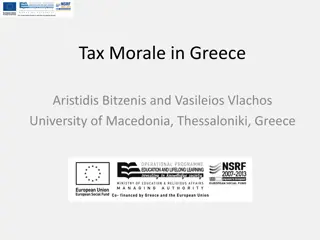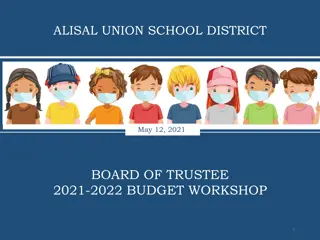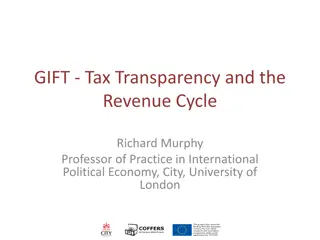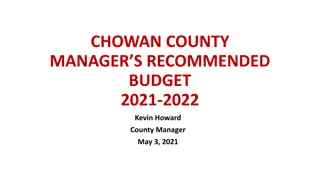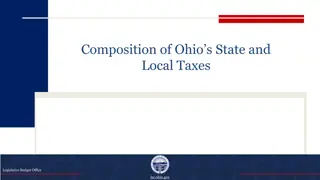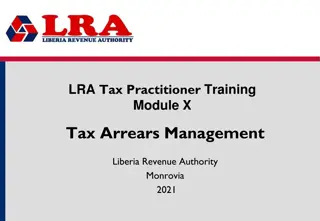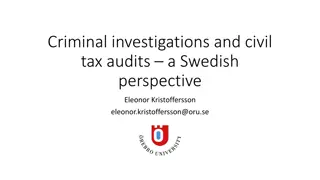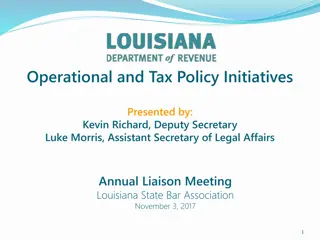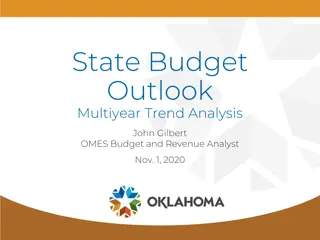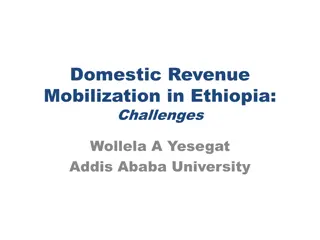Understanding Tax Expenditures and Their Impact on Government Revenue
Tax expenditures are provisions in the U.S. federal tax laws that result in revenue losses by allowing exclusions, exemptions, deductions, credits, preferential tax rates, and deferrals. This concept is crucial as it affects government revenue, and there are challenges in reporting these expenditures accurately. Various examples highlight different types of tax expenditures and their implications on taxpayers. Understanding tax expenditures is essential for policymakers and financial professionals to make informed decisions.
Download Presentation

Please find below an Image/Link to download the presentation.
The content on the website is provided AS IS for your information and personal use only. It may not be sold, licensed, or shared on other websites without obtaining consent from the author. Download presentation by click this link. If you encounter any issues during the download, it is possible that the publisher has removed the file from their server.
E N D
Presentation Transcript
Tax Expenditures 1 D. SCOTT SHOWALTER, CPA, CGFM CHAIRMAN, US FEDERAL ACCOUNTING STANDARDS ADVISORY BOARD 16TH ANNUAL OECD PUBLIC SECTOR ACCRUALS SYMPOSIUM
Disclaimer 2 Views expressed are those of the speaker.
Overview 3 What are tax expenditures? Why do they matter? Challenges and options for reporting?
What Are Tax Expenditures? 4 Revenue losses attributable to provisions of the U. S. Federal tax laws which allow: special exclusion, exemption, or deduction from gross income provide a special credit, a preferential rate of tax, or a deferral of tax liability Source: Congressional Budget and Impoundment Act of 1974
Examples 5 Not taxed: Employer-provided health insurance Gains from the sale of a home Earnings set aside for retirement Interest on state and local bonds
EXAMPLES OF SIX TYPES OF TAX EXPENDITURES EXCLUSION Excludes income that would otherwise constitute part of a taxpayer's gross income. Employees generally pay no income taxes on contributions their employers make on their behalf for medical insurance premiums. EXEMPTION Reduces gross income for taxpayers because of their status or circumstances. Taxpayers may be able to reduce their tax liability if they have a dependent who is a child aged 19 through 23 and is a full-time student. DEDUCTION Reduces gross income due to expenses taxpayers incur. Taxpayers may be able to deduct state and local income taxes and property taxes. CREDIT Reduces tax liability dollar-for- dollar. Additionally, some credits are refundable meaning that a credit in excess of tax liability results in a cash refund. Taxpayers with children under age 17 potentially can qualify for up to a $1,000 partially refundable, per child credit, provided their income does not exceed a certain level. PREFERENTIAL TAX RATE Reduces tax rates on some forms of income. DEFERRAL Delays recognition of income or accelerates some deductions otherwise attributable to future years. Capital gains on certain income are subject to lower tax rates under the individual income tax. Taxpayers may defer paying tax on interest earned on certain U.S. savings bonds until the bonds are redeemed. 6
Tax Policy 7 Tax Policy Social Policy
Largest Tax Expenditures - Fiscal Year 2016 Billions of Dollars 210,980 92,820 67,780 66,600 64,710 62,440 58,270 51,380 44,240 9
Why It Matters 10 Transparency Tax Policy Story of government services
Why It Matters 11 Transparency An important component of a comprehensive overview of financial position and performance. Tax Policy Tax code is not subject to annual review in the same fashion as the budget. Tax reform requires an evaluation of tax expenditures which adds complexity to the challenge. Tell the story of government services They are a tool of government but their success may not be measured and assessed as frequently as other programs. Also, their role may be harder to understand. See http://www.gao.gov/key_issues/tax_expenditures/issue_summary
Is the tax expenditure good policy? See http://www.gao.gov/key_issues/tax_expenditures/issue_summary 12
Does it Help Meet Reporting Objectives? 13 Operating Performance cost of government actions and how costs are financed should be known. Tax expenditures are a growing part of the story of service efforts and accomplishments. Stewardship how the government makes investments that impact the nation s financial condition is important information. Tax expenditures are an investment tool that may be overlooked by citizens.
Challenges 14 Definition (what s normal affects what s in and what s out) Measurement Accuracy
Reporting Options 15 Amounts in financial statements Note disclosures Management s discussion and analysis Required supplementary information Other information
What Is FASAB Proposing? 16 Management s discussion and analysis Note disclosure Other information Monitor progress
Questions 17
Contact Information 18 D. Scott Showalter, CPA, CGFM Chairman, FASAB 919.513.0526 scott_showalter@ncsu.edu www.fasab.gov
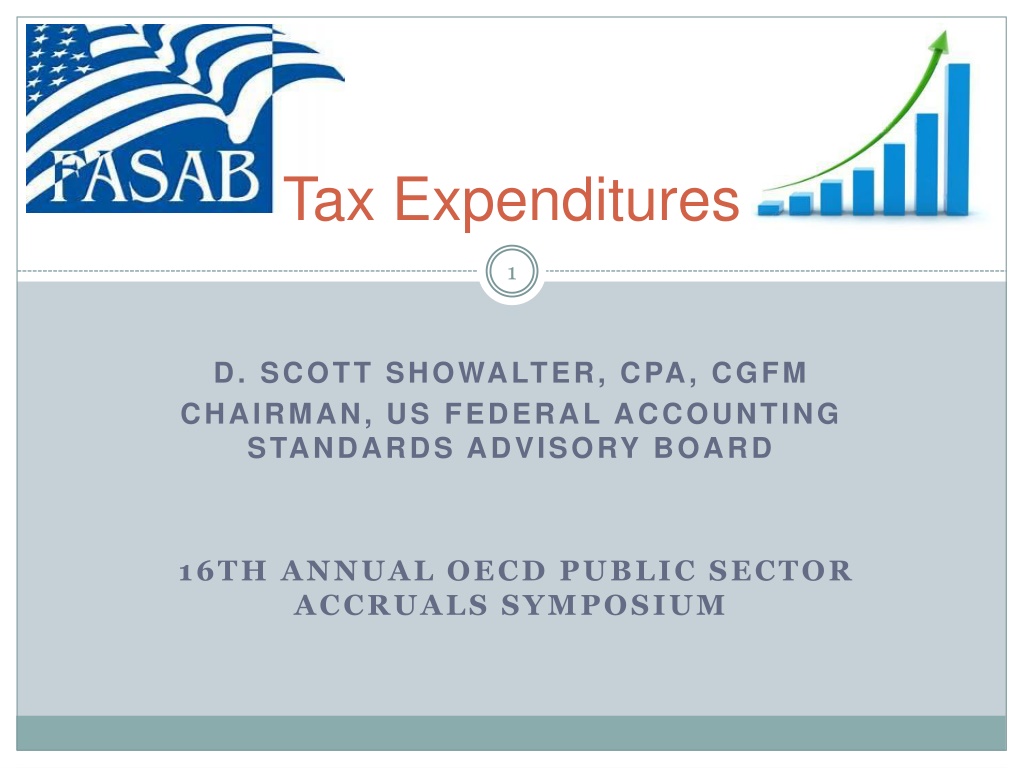

![Town of [Town Name] Real Estate Tax Rates and FY 2024 Budget Summary](/thumb/62211/town-of-town-name-real-estate-tax-rates-and-fy-2024-budget-summary.jpg)
